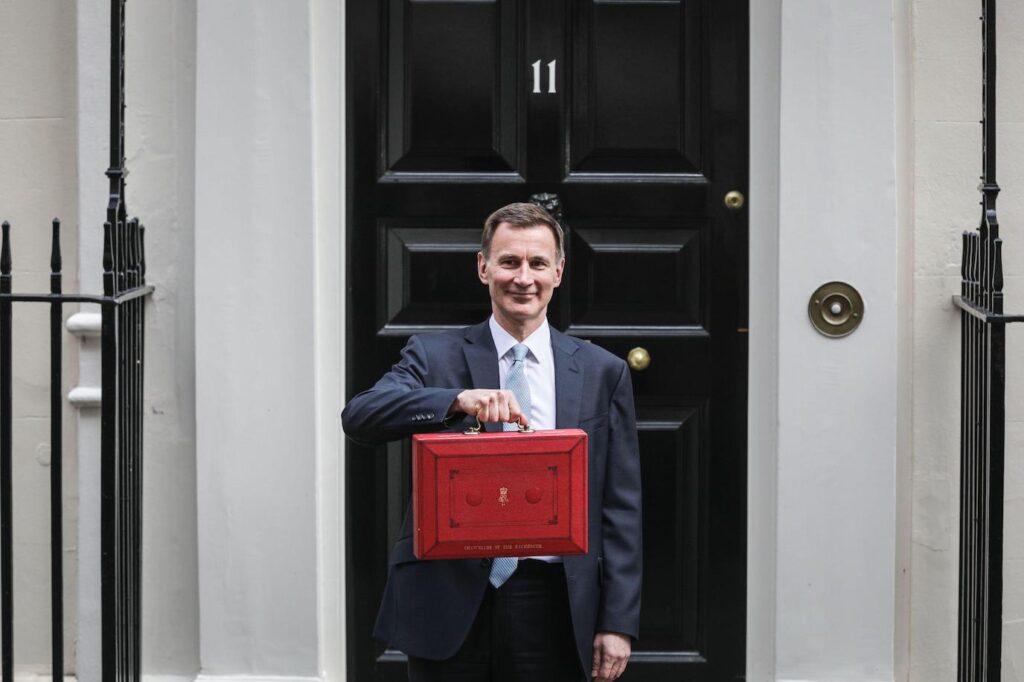Chancellor Jeremy Hunt has this lunchtime delivered his second budget to the House of Commons in a text which was almost identical to the pre trailed media reports of its likely content.
Failing to bend to calls by some on his party’s backbenches to pull out a surprise and introduce a wider cut in income tax, the Chancellor restrained himself to just cutting national insurance by a further 2%.
In doing so, Jeremy Hunt stated his intention to gradually end what he labeled as the ‘unfair’ double taxation regime whereby working people pay both employee national insurance and income tax.
At the same time as reducing employee national insurance – a move which the Labour Party have said they will not reverse – the Chancellor simultaneously performed a strategic U-Turn and adopted the Labour party’s headline tax raising policy on non domiciles.


With the rhetoric of Mr Hunt’s budget statement appearing to contain even more jokes and party political references than normal, the Chancellor’s latest move will now force Labour to find new, and potentially less popular, means of funding its own spending commitments.
Amongst the most notable measures announced by the Chancellor today are:
- A 2% cut in employee national insurance from 10% to 8%.
- An increase in the salary threshold at which child benefit can now be obtained in full from £50,000 to £60,000 per year, with the benefit now tapering out at the higher income level of £80,000.
- Proposals to introduce excise duty on vaping products from October 2025, alongside a further increase in tobacco duty.
- An increase in Air Passenger Duty on non economy flights to reflect recent increases in inflation.
- The abolition of the furnished holiday let rental regime which previously provided tax advantages for those renting out their second properties to holiday makers.
- Alcohol duty remaining frozen.
- Fuel duty also remaining frozen with the previous 5p cut in fuel duty being extended.
- A reduction in the rate of Capital Gains Tax for those owning second properties from 28% to 24% as part of an initiative to increase transactions in the housing market and thereby increase tax revenues.
- Extending the energy profits tax by a further year to 2029 in an initiative set to raise £1.5 billion.
- The abolition of the current tax regime for non domiciles living in the United Kingdom in a move designed to raise £2.7 billion. Those moving to the UK will still though benefit from tax advantages for the first 4 years after they move to the country.
- The creation of a brand new British ISA savings regime, which will increase the savings amount that can be invested in an ISA each year by £5,000 providing those savings are invested in British assets.
Unveiling a series of new financial forecasts to the Commons, the Chancellor also pointed to the UK having now turned a corner on both growth and inflation.
Updating MPs, the Chancellor detailed how inflation is expected fall back within the Bank of England’s 2% target this summer, with economic growth set to rise to 0.7% this year and 1.9% next year.
The Chancellor’s announcements have though received a very different response from across the political spectrum.
Responding to the budget statement in a speech delayed by an unusual Commons vote on a post budget standing order, the Labour leader Sir Keir Starmer described the budget as a ‘last desperate act’ by the government claiming that the public were ‘paying more and more for less and less’.
Reacting to the budget, Paul Nowak, the General Secretary of the Trades Union Congress said, “This is a deeply cynical Budget. The Chancellor knows he won’t have to live with the consequences of the savage spending cuts he’s already imposed across large parts of our public services”.
The Commons leader of the Scottish National Party, Stephen Flynn, attacked the government for using a levy on Scotland’s national resources to fund tax cuts in England. Referring to apparent concern amongst Scottish Conservative MPs with today’s extension of the windfall energy tax, he jokingly suggested that “the prime minister was in danger of turning his colleagues into nationalists”.
Writing on Twitter the Green Party MP Caroline Lucas described the budget as ‘horrific’.
Although the One Nation Group of Conservative MP has welcomed the Chancellor’s approach for ‘sticking to his plan’, it is also far from clear that today’s statement will placate all within the parliamentary Conservative Party.
Prior to the statement a number of leading Conservatives such as John Redwood and Priti Patel had been urging the Chancellor to cut headline income tax as well as national insurance.
Whilst Tom Clougherty, the Executive Director of the free market think tank, the Institute of Economic Affairs said today’s announcements, “ultimately won’t do much to revive the stagnating economy that lies behind most of our current woes”.
The fact today’s budget failed to contain anything further of note, beyond that which was already trailed in this Sunday’s newspapers, is likely to be the firmest sign yet, that the government plans to go deep into this calendar year before calling a general election.
It may yet be, that aided by an improvement to the public finances in the summer, the Chancellor will still be in post to deliver an autumn statement later in the year, one in which he will then introduce further tax cutting measures, just before polling day itself.












